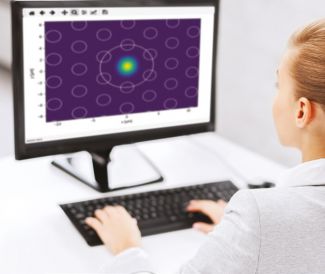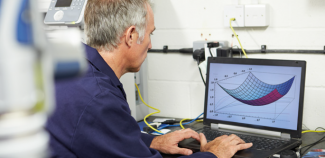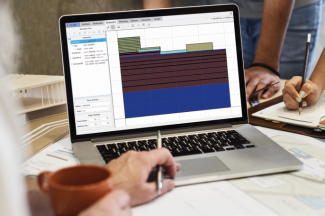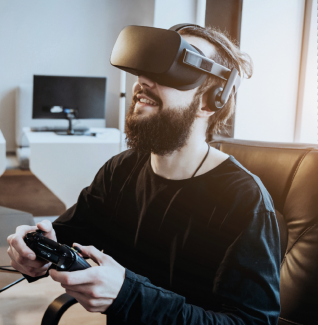Digital control systems.
Typical implementations of control systems are usually configured as local systems, in which the costs rise at an exponential rate with the increasing complexity of the systems. In the case of distributed solutions, the operated telecommunication networks require expensive implementations, in order to meet real-time requirements.

The digital systems for object control via broadly distributed and non-dedicated computer networks, designed and developed at the Institute of Information Technology, enable reduction of the total control system implementation costs.
Within the framework of projects undertaken, the team designs and implements digital systems for control and diagnostics of industrial objects and distributed systems. Various mechanisms are subject to analysis to improve the quality of services and increase the reliability and safety of network communications.
This technology will be of interest to manufacturers of software (e.g. the environment of the Internet of Things).
Software for computer simulations and photonic structures.
Professional design of photonic structures requires support for modelling and prototyping processes.

The Institute of Physics offers dedicated, innovative software for computer analysis of photonic structure properties and parameters. This software package allows for computer simulation of the physical properties of photonic structures, with modelling of heat distribution, current flows, amplification in quantum wells and light propagation in photonic structures. The team’s experience and expertise are unique on a national scale.
This technology will be of interest to ICT companies using semi-conductor technologies.
TuneFollower program and a set of tools for analysis and processing of acoustic signals.
Sound design and special effects creation requires thorough sound analysis and advanced signal processing tools.

The TuneFollower tool, designed and developed at the Institute of Information Technology, is intended to seek melodic patterns in multimedia databases. It enables comparisons of many thousands of melodic sequences per second, identifying the degree of similarity, regardless of local tempo changes and other disturbances. Processing and analysis of acoustic signals is possible thanks to the use of a library implementing an integrated framework, whose modular structure allows for simple implementation and use of algorithms of two basic types: filters and feature extractors .
This technology will be of interest to manufacturers of software products.
Applications of mathematics in industry and biomedicine.
Mathematical modelling is the definition of a specific problem in a mathematical language. The relationships contained in the model reveal an interpretation referring to specific elements of a section of the modelled reality.

The offer of the Institute of Mathematics encompasses. The construction of mathematic models which describe a posed problem, together with a qualitative and numerical analysis to aid decision making and facilitate prognosis.
Examples of problems studied may include: optimisation of cancer therapy microstructure analyses of building materials, definition of vaccination strategies in the case of epidemic and flow analysis. Such models may be used for theoretical trials of various strategies, leaving the real system unaffected.
This service may be applied in industry, medicine, ecology, environment protection and economics.
Computer simulations of photonic structures.
Professional design of photonic structures requires a deep analysis of properties and parameters.

The Institute of Physics offers computer analysis of the properties and prameters of photonic structures. A software package developed by the team allows for computer simulation of the physical properties of photonic structures, with modelling of heat distribution, current flows, amplification in quantum wells and light propagation in photonic structures. The team’s experience and expertise are unique on a national scale.
This service will be of interest to companies in the IT sector and involved in semi-conductor technologies.
Statistical analysis of data.
A crucial element of optimisation processes in business is the analysis of large data packages. It requires advanced IT equipment and dedicated algorithms.

The proposal of the Institute of Mathematics encompasses a statistical analysis of data as well as prognosis and optimisation of business processes, based on analysis of large data sets. The analyses, based on statistical techniques of data analysis and on machine learning technology, allow for the prediction, classification and clasterisation of particular business processes and exploration of new correlations between data.
This service will be of interest to business organisations which are developing and implementing new technologies.
Taking decisions on uncertain or random financial markets.

Analysis of data enables the building of actuarial and financial models which facilitate decision-making procedures.
The offer of the Institute of Mathematics encompasses the analysis of the strength of dependence and the degree of uncertainty of factors in actuarial and financial models, as an advanced tool for entities in the financial branch, including insurance operations.
This service will be of interest to financial research companies.
Parallel processing, analyses and visualisation of multimedia data and virtual reality systems.

Multimedia data processing in real time enables the identification of a user’s/customer’s emotions, improves the quality of multimedia communication and supports therapeutic processes and rehabilitation procedures.
The offer of the Institute of Information Technology encompasses tools which can be used for process visualisation, 3D modelling, real time interactions and rendering, analyses of 2D and 3D motion pictures as well as for the design of interfaces.
This service will be of interest to business organisations in the IT, IoT and GameDev sectors, the film industry, medicine, architecture offices, museums and educational units.
